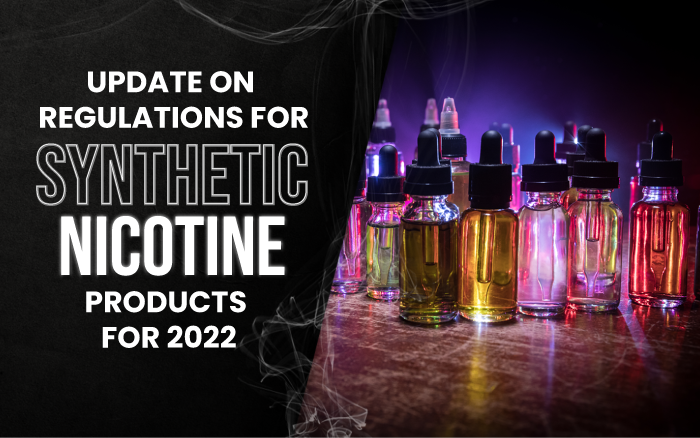Update on Regulations Regarding Synthetic Nicotine Products for 2022
Estimated 0 min read
In today’s blog, we revisit the new synthetic nicotine regulations created by the Food and Drug Administration (FDA) and give our opinion on what steps vape manufacturers should take if they receive a marketing denial order (MDO) from the FDA this time around.
Table of Contents:
- The New Synthetic Nicotine Regulations by the FDA
- An Unrealistic Time Frame to Submit PMTAs
- FDA’s Press Release on July 13, 2022
- Tobacco-Free Kids Pressures FDA
- What Vape Manufacturers Will Probably Do in Case of a MDO or RTA
- Conclusion
The New Synthetic Nicotine Regulations by the FDA
If you are reading this and are unaware of the current FDA regulations regarding synthetic nicotine, it’s only right that we do a quick summary of what has happened in the last few months. On March 15, 2022, President Biden signed into law the Consolidated Appropriations Act of 2022. This new legislation effectively included language that gave the FDA power to regulate non-tobacco nicotine, otherwise known as synthetic nicotine.
Before the law was enacted, synthetic nicotine products existed in a legal gray area since the language in the legislation only gave the FDA power to regulate nicotine products made or derived from tobacco. However, with the passage of the Consolidated Appropriations Act, the FDA will now regulate nicotine products made or derived from any source.
On April 14, 2022, the law went into effect, and from that day onward, the law stated that “manufacturers, distributors, importers and retailers of tobacco products containing non-tobacco nicotine (NTN)—that is, nicotine not made or derived from tobacco, such as synthetic nicotine...” have to comply with all the requirements stated in the Federal Food, Drug, and Cosmetic Act. Some of the requirements in the legislation state that there can be no selling of these items to persons under 21 years of age, marketing of these products can not state that they are modified risk tobacco products, and there can be no distribution of free samples of synthetic nicotine products.
Furthermore, every manufacturer that wants to keep selling synthetic nicotine products was required to turn in a Pre-Market Tobacco Application (PMTA) on May 14, 2022.
An Unrealistic Time Frame to Submit PMTAs
For many manufacturers of synthetic nicotine products, this unrealistic time frame to turn in the required documentation that PMTAs required, which entailed scientific research that industry experts stated should take about six months to properly document, will probably mean that they turned in less than optimal PMTAs that will lead the FDA to most likely deny their application.
Additionally, the FDA was set to decide by July 13, 2022, which products would have market authorization. And now that the date has passed, there has only been a partial update by the FDA in the form of a press release.
FDA’s Press Release on July 13, 2022
On July 13, 2022, the FDA released a press release that stated that approximately 200 manufacturers had filed PMTAs for approximately 1 million non-tobacco nicotine products by the May 14, 2022, deadline. They also went on to state that they had sent two warning letters to two manufacturers who did file PMTAs to remove their products from the market.
The press release also stated that they had sent 107 warning letters to retailers who continued to sell non-tobacco nicotine products illegally to minors. There was no mention of how many manufacturers had achieved market authorization. Still, it did state that they were processing the applications, stating that they were ready to send refuse-to-accept (RTA) letters for manufacturers that did not meet the criteria for acceptance.
Tobacco-Free Kids Pressures FDA
Before the FDA released its press release, on July 12, 2022, Tobacco-Free Kids issued a press release of their own, pressuring the FDA to take immediate action against companies that had not been granted market authorization.
The press release says, “There is no excuse for the FDA failing to act given the mandate and deadlines established by Congress.” Since the deadline for market authorization, which was July 13, was the next day, there was no word or update from the FDA regarding how many manufacturers had filed PMTAs or had acquired market authorization.
Since the deadline for market authorization has come and gone, this may lead to deadline extension for those companies that managed to submit their PMTAs, or it could lead to a total ban of synthetic nicotine products if organizations like Tobacco-Free Kids continue to apply pressure to the FDA to meet the unrealistic deadlines set by congress.
What Vape Manufacturers Will Probably Do in Case of an MDO or RTA
But the likelihood of the FDA extending its timeline seems very slim, and manufacturers are already preparing for the worst. Since almost all synthetic nicotine product manufacturers are expecting an MDO or RTA, they are already planning to take their cases to the court of appeals.
Since a few manufacturers have already found some sort of success with the court of appeals, which has given out motions to stay, allowing manufacturers to continue selling their products even after receiving MDOs, it’s very likely that synthetic nicotine product manufacturers will take the same path. This path has earned a big win for the vaping industry already, with at least one company achieving to overturn an MDO, which many believe has led the FDA to be more thorough with their examinations of PMTAs.
Conclusion
If no timeline extension is made for manufacturers of synthetic nicotine products that have already turned in their PMTAs to the FDA, the FDA will effectively be killing any chance to explore and study the opportunities that synthetic nicotine can offer the world. Manufacturers of this type of synthetic nicotine have long claimed that it is not only cleaner but also safer for nicotine users when compared to natural nicotine, but no real studies have been made to back up these claims. Effectively banning every single synthetic nicotine product in the market will put a complete stop to any research being conducted on synthetic nicotine







